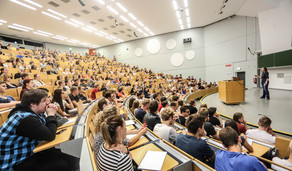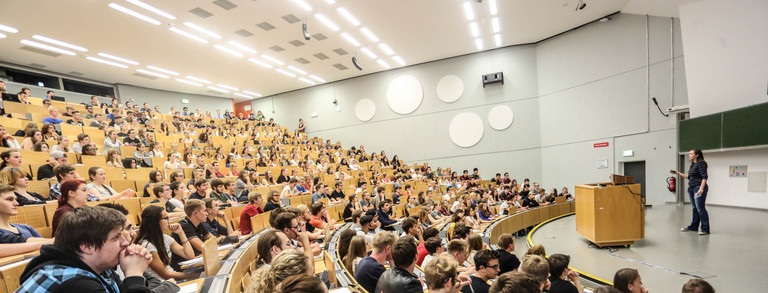AI Colloquium
The AI Colloquium is a series of lectures dedicated to cutting-edge research in the field of machine learning and artificial intelligence, coorganized by the Lamarr Institute for Machine Learning and Artificial Intelligence (Lamarr Institute), the Research Center Trustworthy Data Science and Security (RC Trust), and the Center for Data Science & Simulation at TU Dortmund University (DoDas).
Programme
Distinguished researchers deliver captivating lectures followed by vibrant discussions. However, unlike traditional colloquia, the AI Colloquium prioritizes interactive dialogue, fostering international collaboration. Conducted primarily in English, these 90-minute sessions feature hour-long lectures and 30-minute Q&A sessions. Join every Thursday at 10 AM c.t. for a stimulating exploration of cutting-edge topics. Whether in-person at our Lecture Room on Fraunhofer Strasse 25 or via Zoom, our hybrid format ensures accessibility for all.
| Day (usually) | Thursday |
| Start and end time | 10 AM c.t. - 12 AM |
| Duration of Presentation | 60 Minutes |
| Location (usually) | Lecture Room 303 3. Floor Fraunhofer Strasse 25 Dortmund |
Upcomming Events
AI in Tension Between Cognitive Science and Society
- Ethics & Philosophy

Abstract: In this talk, I examine the dual role of AI in both cognitive science and society. On one hand, significant ethical and theoretical concerns that call for caution in overstating the similarities between human-like intelligence and cutting-edge AI systems widely used today (such as AlexNet, GPT-4, etc.). On the other hand, cognitive scientists and philosophers view such deep neural networks as valuable tools for modelling and gaining insights into the human mind. These two perspectives stand in tension with one another that calls for a re-examination of the role of AI in cognitive science. While there are promising exploratory successes in specific domains such as perceptual categorisation, the contributions of deep neural networks to advancing our understanding of cognition are less revolutionary than often claimed and better put as a continuation of earlier revisions to computationalism, posing the worry that relative to the immense resources going in to building these models, the payoffs from theory lag significantly behind.
Dr. Nina Poth

Bio - Nina Poth is Assistant Professor in AI and Philosophy of Mind and Language at Radboud University, The Netherlands. She works in the philosophy of cognitive science with a special interest in theories on learning, reasoning, and (ir)rationality in humans and AI. Before coming to Radboud University, Nina worked as a postdoc in the DFG Excellence Cluster “Science of Intelligence” at the Humboldt and Technical Universities Berlin and in the Volkswagen project “Situated Cognition” at Ruhr University Bochum. In 2020, she completed her PhD at the University of Edinburgh where she examined the philosophical foundations of Bayesian models of concept learning from perception.
How to attend
If you are interested in participating online, please register via the following form: https://forms.microsoft.com/r/W3whw0ac3B. If you would like to attend in person, please send an e-mail to udnn.httu-dortmundde.
This lecture is a special edition of the AI Colloquium at TU Dortmund University. This lecture series will investigate fundamental issues in AI from the vantage point of philosophy of science, which includes topics such as the transparency and interpretability of AI within scientific research, as well as the impact of AI on scientific understanding and explanation.
Past Events
AI in Tension Between Cognitive Science and Society
- Ethics & Philosophy

Abstract: In this talk, I examine the dual role of AI in both cognitive science and society. On one hand, significant ethical and theoretical concerns that call for caution in overstating the similarities between human-like intelligence and cutting-edge AI systems widely used today (such as AlexNet, GPT-4, etc.). On the other hand, cognitive scientists and philosophers view such deep neural networks as valuable tools for modelling and gaining insights into the human mind. These two perspectives stand in tension with one another that calls for a re-examination of the role of AI in cognitive science. While there are promising exploratory successes in specific domains such as perceptual categorisation, the contributions of deep neural networks to advancing our understanding of cognition are less revolutionary than often claimed and better put as a continuation of earlier revisions to computationalism, posing the worry that relative to the immense resources going in to building these models, the payoffs from theory lag significantly behind.
Dr. Nina Poth

Bio - Nina Poth is Assistant Professor in AI and Philosophy of Mind and Language at Radboud University, The Netherlands. She works in the philosophy of cognitive science with a special interest in theories on learning, reasoning, and (ir)rationality in humans and AI. Before coming to Radboud University, Nina worked as a postdoc in the DFG Excellence Cluster “Science of Intelligence” at the Humboldt and Technical Universities Berlin and in the Volkswagen project “Situated Cognition” at Ruhr University Bochum. In 2020, she completed her PhD at the University of Edinburgh where she examined the philosophical foundations of Bayesian models of concept learning from perception.
How to attend
If you are interested in participating online, please register via the following form: https://forms.microsoft.com/r/W3whw0ac3B. If you would like to attend in person, please send an e-mail to udnn.httu-dortmundde.
This lecture is a special edition of the AI Colloquium at TU Dortmund University. This lecture series will investigate fundamental issues in AI from the vantage point of philosophy of science, which includes topics such as the transparency and interpretability of AI within scientific research, as well as the impact of AI on scientific understanding and explanation.
AI in Tension Between Cognitive Science and Society
- Ethics & Philosophy

Abstract: In this talk, I examine the dual role of AI in both cognitive science and society. On one hand, significant ethical and theoretical concerns that call for caution in overstating the similarities between human-like intelligence and cutting-edge AI systems widely used today (such as AlexNet, GPT-4, etc.). On the other hand, cognitive scientists and philosophers view such deep neural networks as valuable tools for modelling and gaining insights into the human mind. These two perspectives stand in tension with one another that calls for a re-examination of the role of AI in cognitive science. While there are promising exploratory successes in specific domains such as perceptual categorisation, the contributions of deep neural networks to advancing our understanding of cognition are less revolutionary than often claimed and better put as a continuation of earlier revisions to computationalism, posing the worry that relative to the immense resources going in to building these models, the payoffs from theory lag significantly behind.
Dr. Nina Poth

Bio - Nina Poth is Assistant Professor in AI and Philosophy of Mind and Language at Radboud University, The Netherlands. She works in the philosophy of cognitive science with a special interest in theories on learning, reasoning, and (ir)rationality in humans and AI. Before coming to Radboud University, Nina worked as a postdoc in the DFG Excellence Cluster “Science of Intelligence” at the Humboldt and Technical Universities Berlin and in the Volkswagen project “Situated Cognition” at Ruhr University Bochum. In 2020, she completed her PhD at the University of Edinburgh where she examined the philosophical foundations of Bayesian models of concept learning from perception.
How to attend
If you are interested in participating online, please register via the following form: https://forms.microsoft.com/r/W3whw0ac3B. If you would like to attend in person, please send an e-mail to udnn.httu-dortmundde.
This lecture is a special edition of the AI Colloquium at TU Dortmund University. This lecture series will investigate fundamental issues in AI from the vantage point of philosophy of science, which includes topics such as the transparency and interpretability of AI within scientific research, as well as the impact of AI on scientific understanding and explanation.





